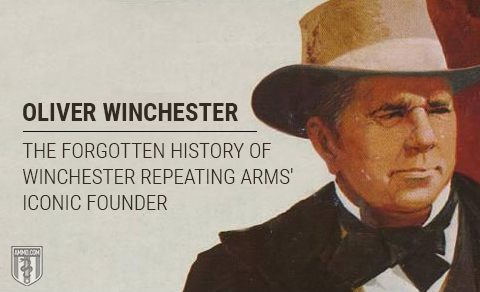Oliver Winchester: The Forgotten History of Winchester Repeating Arms' Iconic Founder
You're free to republish or share any of our articles (either in part or in full), which are licensed under a Creative Commons Attribution 4.0 International License. Our only requirement is that you give Ammo.com appropriate credit by linking to the original article. Spread the word; knowledge is power!
 Winchester Repeating Arms founder Oliver Winchester was born in Boston, Massachusetts, on November 30, 1810. While his life is largely indistinguishable from his career as a gun manufacturer, it’s worth noting that, in addition to revolutionizing the American firearms market, he also served as the 32nd Lieutenant Governor of Connecticut as a Republican from May 1866 to May 1867, underneath Joseph Roswell Hawley. He was also one of the great philanthropists of his time, giving a lot of money in particular to Yale University, which is in New Haven.
Winchester Repeating Arms founder Oliver Winchester was born in Boston, Massachusetts, on November 30, 1810. While his life is largely indistinguishable from his career as a gun manufacturer, it’s worth noting that, in addition to revolutionizing the American firearms market, he also served as the 32nd Lieutenant Governor of Connecticut as a Republican from May 1866 to May 1867, underneath Joseph Roswell Hawley. He was also one of the great philanthropists of his time, giving a lot of money in particular to Yale University, which is in New Haven.
Winchester was born on the outskirts of Boston, at a time when there was still farming going on in those parts. His family were penniless farmers in a hardscrabble world. He had almost nothing in the way of formal education. What he did have, however, was a solid amount of business sense and no shortage of gumption. He was apprenticed as a church builder, but quickly began earning a tidy sum as the inventor of a new style of shirt collars for men, which constituted his first patent.
Winchester began his business career making garments in New York and New Haven, and selling men’s furnishings in Baltimore. After years of successful business, he started looking for new opportunities. Horace Smith and Daniel Wesson (you might have heard of their later endeavor, Smith & Wesson Revolver Company) acquired a rifle design and improved it with the help of shop foreman, Benjamin Tyler Henry (yes, that Henry). In 1855, they began manufacturing the “Volcanic” lever-action rifle. The company was incorporated as the Volcanic Repeating Arms Company. The largest stockholder was Oliver Winchester.
Winchester Repeating Arms
The new rifle saw limited success and Winchester saw an opportunity to seize control over the failing company. He did so and renamed it the New Haven Arms Company. Sales were slow at first, but Benjamin Henry improved the Volcanic repeating rifle’s design with an enlarged frame and magazine to better accommodate an all-new brass-cased .44 caliber cartridge.
Henry’s ingenuity put the company on the commercial map, and in 1860, the patent for the now legendary Henry rifle was issued. Over 12,000 Henry rifles were produced over the next six years, many of which were used in the War Between the States. In the following months, Henry, angered over what he saw as inadequate compensation, filed a lawsuit for ownership of the company. This was when Winchester reorganized the company as the Winchester Repeating Arms Company.
Winchester soon rolled off its first rifle – the Model 1866. Based on the Henry rifle, it boasted a wooden forend and an improved magazine. Soon larger caliber rifles like the iconic Model 1873, “The Gun That Won The West,” brought greater notoriety to the company. Winchester sadly missed the opportunity to see his company’s crowning achievements; he passed away in December of 1880.
Winchester Repeating Arms Company’s collaboration with John Browning brought great success with an array of shotguns, including the Model 1885, which is still in production. The 20th century saw a series of new innovations in arms technology, many from Winchester’s top engineer at the time, T.C. Johnson. But it was the start of the First World War that unleashed the productive forces. The company became a major producer of the .30-06 M1917 Enfield rifle for the United States military, and worked once more with Browning to develop the .50 caliber BMG.
Winchester's Bankruptcy
During the War, Winchester borrowed heavily to finance expansion. They used their surplus production capacity to manufacture consumer goods such as kitchen knives, roller skates, and refrigerators in an attempt to pay down the debt. The strategy failed, and the Great Depression put the company into bankruptcy. John M. Olin’s Western Cartridge Company bought the Winchester Repeating Arms Company at auction in 1931, with plans to restore the brand to its former glory. World War II helped, with Winchester producing the U.S. M1 Carbine and the M1 Garand rifle during this time period.
Rising labor costs and other companies’ cast-and-stamped production methods continued to bedevil Winchester. Olin sold the company back to its employees in 1980, which re-incorporated as the U.S. Repeating Arms Company. Olin kept the ammunition business. U.S. Repeating Arms went bankrupt in 1989, with the New Haven plant finally closing its doors on January 16, 2006.
In August of 2006, Olin Corporation entered a new licensing agreement with Browning to make Winchester-brand rifles and shotguns once again. The Model 1885, Model 1892, and Model 1886 are all produced in Japan by the Miroku Corporation, before importation to the U.S. by Browning. Currently, Fabrique Nationale d’Herstal (FN) makes the remainder of Winchester’s rifle and shotgun lineup in various locations around Europe.
The Winchester Legacy
Olin still makes Winchester-branded ammunition. Some of the most successful cartridges ever invented have been under the Winchester name: the .44-40 WCF, the .30-30 WCF, the .32 Winchester Special, the .50 BMG, the .270 Winchester, the .308 Winchester (the commercial version of the 7.62x51mm NATO), the .243 Winchester, the .22 WMR (aka the .22 Magnum), and the .300 Winchester Magnum. In North America, the .30-30 and .308 Winchester are some of the best-selling cartridges in firearm history.
Not all of his descendents are proud to bear the Winchester name. Sarah Lockweed Pardee Winchester, widow of William Wirt Winchester and heiress to a great deal of the Winchester fortune, believed the family was cursed. The home where she lived is now a “haunted house” of sorts, the Winchester Mystery House. Another one of his descendents, Laura Trevelyan, a BBC reporter, has written about her great-great-great grandfather in less than glowing terms.
Either way, Winchester is one of the great industrial revolutionaries of the United States. His name might not be as widely known as Thomas Edison, but his impact on world history has arguably been larger.
Unsung Heroes
- S.B. Fuller
- Annie Oakley
- Edward Snowden
- Sam Colt
- Davy Crockett
- Susan B. Anthony
- Milton Friedman
- Vaclav Havel
- Charlton Heston
- Sojourner Truth
- Ted Nugent
- Eugene Stoner
- John Garand
- Charles Parker
- Oliver Winchester
- Charles Newton
- Lysander Spooner
- John Moses Browning
- Butch O'Hare
- Georg Luger
- Elmer Keith
- Benjamin Tyler Henry
- Ron Paul
- Witold Pilecki
- Roof Koreans
- Belle Starr
- Carlos Hathcock
